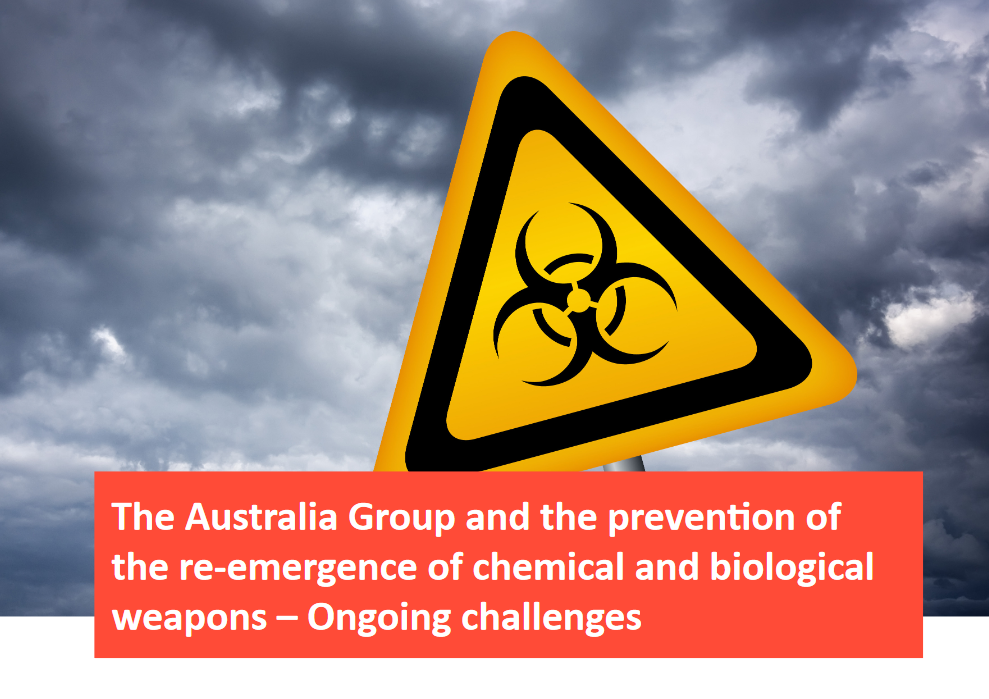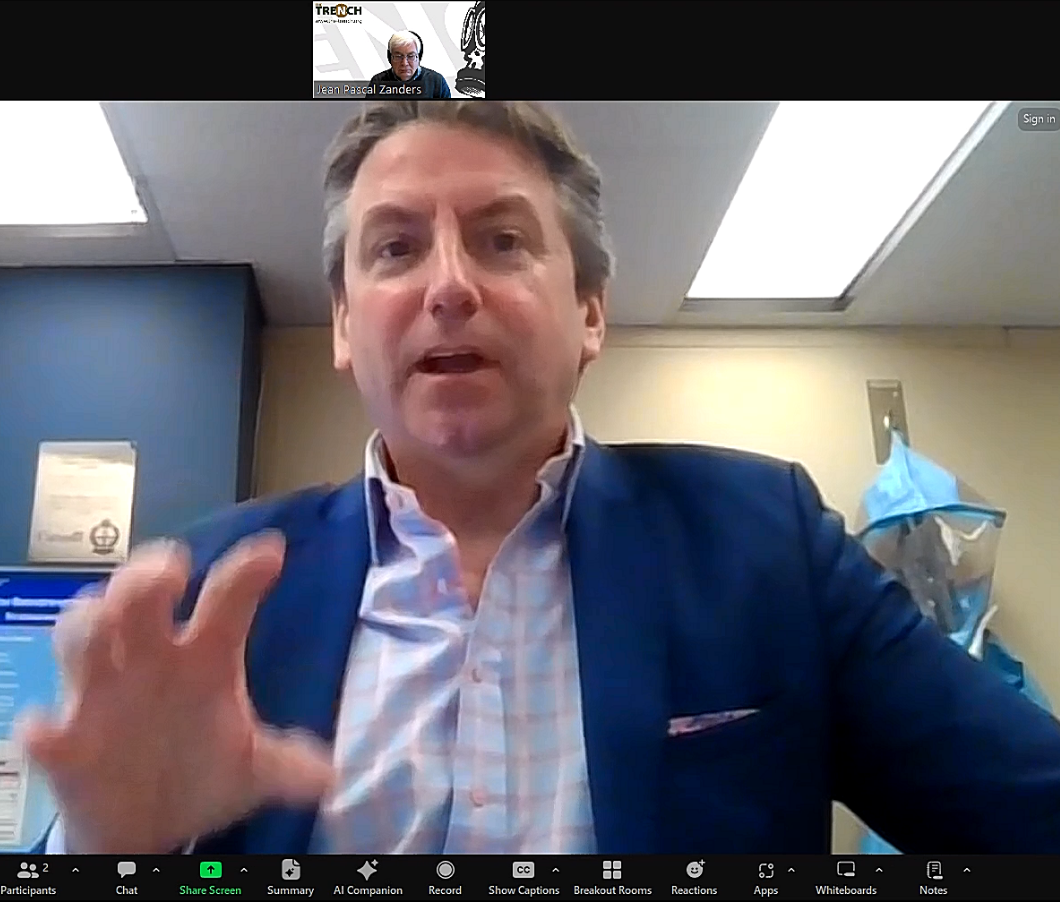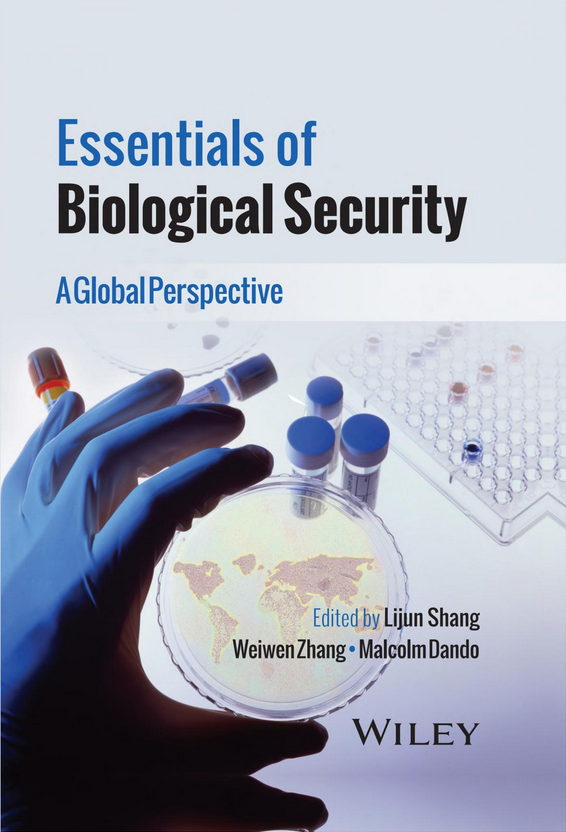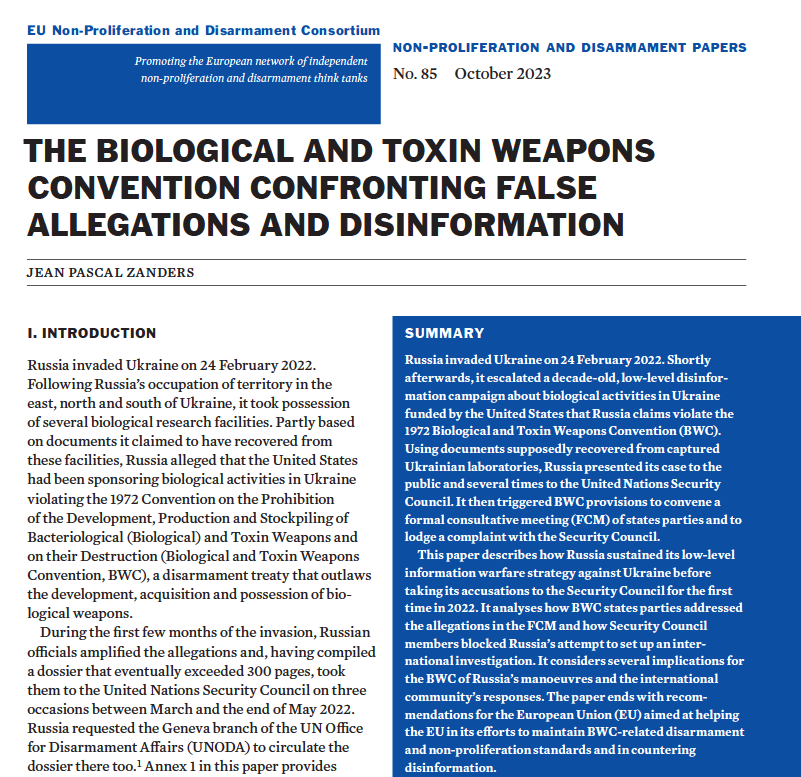Aiming for a future verification system for the BTWC
This posting is based on comments made during a panel on ‘The Future of Biological Weapons’ at the annual conference of the EU Non-Proliferation and Disarmament Consortium, held in Brussels on 13 November 2024. Previously 1996 was a year of optimism. Held between the opening for signature (January 1993) and entry into force (April 1997) of the Chemical Weapons Convention (CWC), the Fourth Review Conference of the Biological and Toxin Weapons Convention (BTWC) decided to give the Ad Hoc Group (AHG) a mandate to negotiate a legally binding protocol to equip the BTWC with, among other things, a verification …
Confidence in disarmament: some insights from the treaties banning biological and chemical weapons
Confidence in disarmament: some insights from the treaties banning biological and chemical weapons (Video presentation, delivered in French on the occasion of the 10th anniversary of the Initiatives pour le désarmement nucléaire (IDN).) Hello everyone! I thank the organisers for inviting me to participate in this symposium to celebrate the 10th anniversary of the IDN. Congratulations! As you listen to my pre-recorded presentation, I am travelling from The Hague, where I attended the annual meeting of the States Parties to the Chemical Weapons Convention (CWC), to Geneva, where I will participate in two and a half weeks of meetings of …
Announcement: BWC Advanced Education Course
[Applications open until 29 September] State Parties, particularly from the Global South, often lack the resources, knowledge, and expertise to participate in the Biological Weapons Convention (BWC) diplomatic process more meaningfully. To address this challenge, UNIDIR, Diplo Foundation and FRS are organizing the BWC Advanced Education Course (BWCedu). The course will equip key stakeholders – government officials in capital with responsibilities in BWC implementation, aspiring and active diplomats and life scientists working on BWC issues and biological threats – with the essential knowledge, skills and expertise to actively participate in the BWC diplomatic process and thus contribute to a stronger …
Education for disarmament and non-proliferation
Building a culture of responsibility: education for disarmament and non-proliferation Journal of Strategic Trade Control, Special Issue, Vol. 2 (September 2024) I am honoured to have been invited to contribute to the Special Issue of the Journal of Strategic Trade Control (JoSTC) focussed on Training programs to counter current and emerging biological and chemical proliferation risks: themes, practices, and lessons learnt. Between January 2018 and December 2023, I was involved in the design, development and implementation of a master’s course on dual-use technology transfer control, which was implemented in Central Asia through the International Science and Technology Centre (ISTC) and …
The Australia Group and the prevention of the re-emergence of chemical and biological weapons
The European Union Non-Proliferation and Disarmament Consortium held its 11th Consultative Meeting in Brussels on 15 and 16 September 2022. Its central theme was the “Topicality of multilateral export control regimes”. On the second day, one of the four breakout sessions addressed the Australia Group, an informal arrangement coordinating technology transfer controls relating to dual-use agents and equipment with potential relevance for developing and producing chemical and biological weapons. Introducers were Ms Esmée de Bruin (Netherlands), Dr Mónica Chinchilla (Spain) and Ms Élisande Nexon, PharmD (France). I had the honour of moderating the session. The three speakers have different backgrounds, …
Response is failure in the primary mission of preventing CBW
The Global Partnership against the Spread of Materials and Weapons of Mass Destruction has now been around for over two decades. In the wake of the terrorist attacks against the US in September 2001, it started out as an effort to mobilise the resources of the G8 members to prevent terrorist acquisition of nuclear, biological and chemical weapons, and related materials. The weapons, technologies and skills available from the former Soviet Union presented a significant proliferation risk, which the US was already addressing through the Cooperative Threat Reduction (CTR) programme. Now comprising 31 members, the Global Partnership (GP) played a …
Falling between the Cracks and by the Sides
Next month, Essentials of Biological Security: A Global Perspective edited by Lijun Shang, Weiwen Zhang and Malcolm Dando will be published. The book offers an introduction to biological security and the chemical and biological weapons (CBW) threat spectrum and explores the history of biological weapons from antiquity to modern day. Its core comprises expert analyses of the Biological and Toxin Weapons Convention and other relevant international agreements and organisations and practical discussions of dual-use technologies and how to minimise their risk. (For a preview of the book contents, click here.) I contributed the chapter Falling between the Cracks and by …
The BTWC Confronting False Allegations And Disinformation
Introduction Russia invaded Ukraine on 24 February 2022. Following Russia’s occupation of territory in the east, north and south of Ukraine, it took possession of several biological research facilities. Partly based on documents it claimed to have recovered from these facilities, Russia alleged that the United States had been sponsoring biological activities in Ukraine violating the 1972 Convention on the Prohibition of the Development, Production and Stockpiling of Bacteriological (Biological) and Toxin Weapons and on their Destruction (Biological and Toxin Weapons Convention, BWC), a disarmament treaty that outlaws the development, acquisition and possession of biological weapons. During the first few …
Heard It on the X: The active US biological weapons programme in Ukraine
Do you remember the 1975 song ‘Heard It on the X’ by the Texan blues-rock band ZZ Top? In the 1960s and 70s, the ‘X’ referred to the first letter of the codes for Mexican private radio stations. Contrary to their American counterparts, they broadcast with unlimited wattage and thus covered most of the USA. Anybody could buy any amount of radio time. So, many US preachers and other quacks exploited the opportunity to peddle their ‘truths’, Jesus-autographed prayer cloths, snake oils, or whatever. Almost half a century later, Elon Musk bought Twitter, rebranded it ‘X’, and began pushing his …
On the medieval siege of Caffa and Black Death
Catapulting corpses? A famous case of medieval biological warfare probably never happened By Matt Field, August 10, 2023 Poke through the history of biological weapons long enough and you will likely come across a particularly macabre claim. In 1346, the story goes, an army of the Golden Horde—an offshoot of Genghis Khan’s Mongol empire—was laying siege to Caffa, a Genoese trading center on the Crimean Peninsula. But as Janibeg, the ruler of the Golden Horde, waited for Caffa to surrender, his fighters began to succumb to a mysterious ailment. “It was as though arrows were raining down from heaven to …










